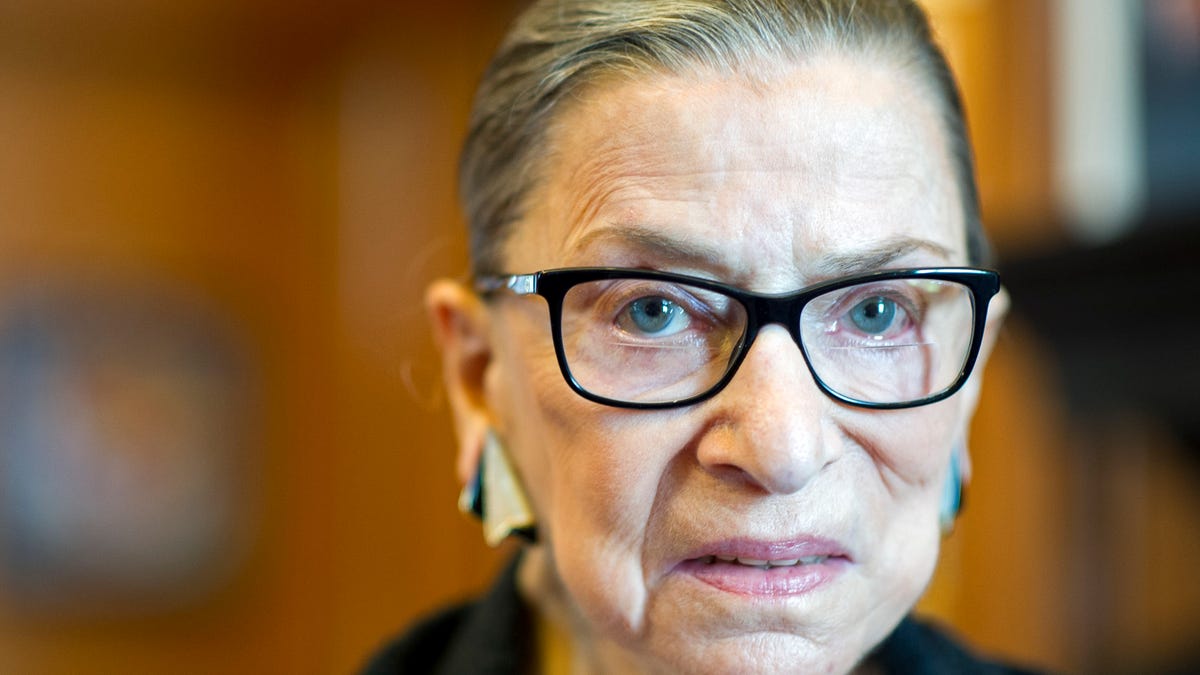
July 31, 2014: Supreme Court Justice Ruth Bader Ginsburg in her Supreme Court chambers in Washington. (AP)
It is better to remain silent and be thought a partisan hack, to paraphrase an old saying, than to open one’s mouth and remove all doubt. When even liberal news outlets like the New York Times and the Washington Post all agree with conservative commentators that Associate Justice of the Supreme Court Ruth Bader Ginsburg is out of line, you know things are bad.
In three recent interviews, Ginsburg publicly denounced the presumptive Republican nominee, Donald Trump, for a variety of flaws. “Flinging herself into the mosh pit” of the presidential contest, she “poured out her thoughts” on the presidential race and Trump’s candidacy, and even hinted that she might resign if Hillary Clinton wins the election.
Her “political punditry” and “name-calling” were “baffling” to some, since they “call her own commitment to impartiality into question,” while to others they demonstrated “astonishingly bad judgment.” Judges, as another paper said, must “muzzle themselves” when it comes to the political process because politicization “undermines public faith in the impartiality of the courts.”
That’s what her allies are saying. And they’re right.
Justice Ginsburg has always had a reputation for using her judicial perch to pursue her political preferences, even if she hasn’t always been so candid about it.
There’s a reason why ethics rules require judges in lower federal courts to refrain from publicly endorsing or opposing candidates for public office. Judges are supposed to be faithful interpreters of the law, not politicians disguised in judicial robes. By inserting themselves into partisan political contests, judges lose their independence and instead become political actors, taking on all of the team loyalties that we expect from political parties. That loyalty undermines the Constitution’s separation of powers, encouraging judges to become advocates for partisan political causes instead of impartial arbiters of the law.
Of course, none of us who have followed Ginsburg’s jurisprudence are surprised by anything that she said explicitly this week.
Justice Ginsburg has always had a reputation for using her judicial perch to pursue her political preferences, even if she hasn’t always been so candid about it. In her confirmation hearings in 1993, Ginsburg famously declined to answer any and all questions about issues that might come before her, such as a constitutional right to polygamy, legalizing prostitution, or the abolition of separate prisons for men and women.
In a burst of candor in 2009, however, Ginsburg admitted that the infamous Roe v. Wade decision was motivated, not by the text of the Constitution, but by the desire to control “growth in populations that we don’t want to have too many of.” What populations did Ginsburg think should be aborted? Poor children.
In 2014, Justice Ginsburg, having recently been dubbed “Notorious R.B.G.” by adoring left-wing fans, again opened up the floodgates, admitting that her votes in death penalty cases are dictated by her political strategy for abolishing the death penalty, not the Constitution.
Ginsburg’s comments are only the tip of the iceberg. Her two decades on the Supreme Court have demonstrated that, like the other liberal justices on the Supreme Court, she doesn’t think that her job is to apply the Constitution and laws as written. Rather, she wants to impose her personal preferences, regardless of what the law actually says. That conception of the judicial office is simply incompatible with the Constitution.
Ginsburg aside, the challenge for the next president will be to appoint Supreme Court justices who take seriously their assigned role under the Constitution. They must be justices who will uphold the law, even when they don’t like the outcome, especially when it’s politically unpopular.
Anything else is courting a constitutional disaster of Ginsburgian dimensions.
